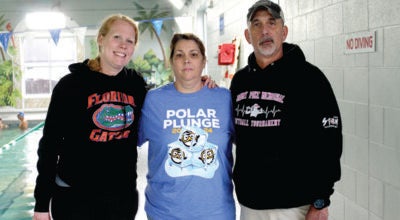Hearts for Haiti
Published 7:44 pm Tuesday, November 19, 2013
Nobody is quite sure what happened to 8-year-old Carmelie’s parents. She’s living with a woman she calls her grandma, but that’s what everyone in the little village calls the lady, and it could be that she has no blood relation to Carmelie at all.
That’s just the way things are for millions of children in Haiti, and it broke the hearts of a Suffolk pastor and his wife.
Chris and Christina Surber will be headed back to Haiti, the poorest nation in the Western Hemisphere, in February. It will be his second visit and her third. When they travel this time, they’ll be taking their own children — ranging from 18 months to Carmalie’s age — along for the mission experience.
It’s hard to tell who is more excited about the upcoming trip — the pastor and his wife, who ache to help the little girl they say is the reason they feel so connected to this destitute place, or their children, for whom this will be their first mission trip.

Christina Surber with Carmelie, an 8-year-old Haitian girl she met on a recent mission trip to the impoverished nation.
Eight-year-old Sebastian Surber, who wants to teach an art class for the kids in the village of Montrouis in Haiti: “Dad, you know — we can use anything to teach them about Jesus!”
Five-year-old Ephram Surber, cashing in $99.01 in change at a Coinstar machine: “All I want to do is help those kids in Haiti, Dad. They’re my friends.”
Thirty-six-year-old Chris Surber, who has pastored the missions-minded Cypress Chapel Christian Church for about two years: “My hope is to transform that one little girl’s life and teach her about Jesus.”
The Rev. Surber is often passionate about things and ideas, but when he talks about Haiti the passion moves to a whole new level.
“This is a place where such pure ministry is happening,” he says. “God has used hundreds of my sermons to allow me to paint myself into a corner. I want to take a breath of fresh air, which is a funny way of putting it, because the air isn’t always fresh in Haiti.”
Indeed, on his flight into Port au Prince with Christina in September, he says, he looked down at the desolation surrounding the airport and thought he could not possibly understand why his wife seemed so excited to return.
“When I first got on the truck in Port au Prince, I wanted to turn around and go home,” he says. After a day or two among the people of Montrouis, things were beginning to change: “I had a feeling … of really wanting to embrace that place and at the same time wanting to run away.”
Surber describes Haiti in terms you might expect from someone with young children. If you shipwrecked a bunch of kids on a deserted island and then came back in 40 years, he says, you’d expect — at best — to find them barely surviving. That’s what Haiti looks like, and the 2010 earthquake only exacerbated an existing problem, he says.
There are no sewer systems, people bathe publicly in the same wells and fountains where others get their water, there is an epidemic of orphaned children and the Haitian government is loathe to allow most of those children to be taken out of the country, either for adoption or for modern medical treatments.
With its land 98-percent deforested, Haiti is an ecological disaster. With 80 percent of its population living below the poverty line and 54 percent in abject poverty, Haiti is an economic disaster. And with a sometimes bizarre mix of Protestant Christianity, Catholicism and voodoo, Haiti is a spiritual disaster.
Yet Surber sees hope amid what even he describes as chaos.
“The people, by contrast to the environment, for the most part are so happy and appreciative,” he says. “They’re quick to smile and have a sense of humor.”
“God is at work there,” he continues. “There seems to be a revival taking place there, and people are stepping away from superstition. You can feel the potential for change in that country.
“In Haiti, I showed up with a Bible, and people wanted to know what I had to say.”







